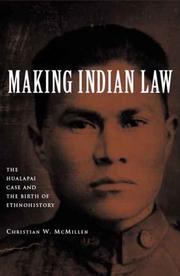| Listing 1 - 3 of 3 |
Sort by
|
Book
ISBN: 077482073X 1280777850 9786613688248 0774815620 0774815604 0774815612 9780774815628 9780774815604 9780774815611 Year: 2010 Publisher: Vancouver
Abstract | Keywords | Export | Availability | Bookmark
 Loading...
Loading...Choose an application
- Reference Manager
- EndNote
- RefWorks (Direct export to RefWorks)
"Delgamuukw. Mabo. Ngati Apa. These cases and others have in recent years created a framework for litigating Aboriginal title in countries such as Canada, Australia, and New Zealand. The contributors to this path-breaking book argue that our understanding of where the concept of Aboriginal title came from -- and where it may be going -- can also be enhanced by exploring legal developments in these former British settler colonies in a comparative and multidisciplinary framework. Aboriginal Title and Indigenous Peoples brings together a distinguished group of scholars who trace how the doctrine of Aboriginal title evolved as indigenous peoples and their laws interacted with settlers and the legal systems that developed in these three common law countries. Part 1 reveals the historical role that legislatures and courts played in the extinguishment and acquisition of Aboriginal title and land. Part 2 shows that although each country's development was distinctive, common issues and legal developments shaped -- and continue to inform -- indigenous peoples' struggle for recognition of their rights."--pub. desc.
Indigenous peoples --- Native title (Australia) --- Indian title --- Legal status, laws, etc. --- Indigenous title --- Aboriginal Indian title --- Indian right of occupancy --- Original Indian title --- Recognized Indian title --- Tribal right of occupancy --- Indians of North America --- Land titles --- Aboriginal title (Australia) --- Australian aboriginal title --- Aboriginal Australians --- Torres Strait Islanders --- Land tenure --- Ethnology
Book
ISBN: 0773581847 0773581839 9780773581838 9780773539211 0773539212 9780773536869 0773536868 Year: 2010 Publisher: Montréal Ithaca McGill-Queen's University Press
Abstract | Keywords | Export | Availability | Bookmark
 Loading...
Loading...Choose an application
- Reference Manager
- EndNote
- RefWorks (Direct export to RefWorks)
Answers the question: Should Canada's First Nations have full ownership of reservation lands?
Indian title --- Indians of North America --- Land tenure --- Legal status, laws, etc.

ISBN: 1281735000 9786611735005 0300135238 9780300135237 9781441645630 1441645632 1282089315 9781282089310 0300114605 9780300114607 9780300143294 030014329X 9781281735003 6611735003 Year: 2007 Publisher: New Haven Yale University Press
Abstract | Keywords | Export | Availability | Bookmark
 Loading...
Loading...Choose an application
- Reference Manager
- EndNote
- RefWorks (Direct export to RefWorks)
In 1941, after decades of struggling to hold on to the remainder of their aboriginal home, the Hualapai Indians finally took their case to the Supreme Court-and won. The Hualapai case was the culminating event in a legal and intellectual revolution that transformed Indian law and ushered in a new way of writing Indian history that provided legal grounds for native land claims. But Making Indian Law is about more than a legal decision. It's the story of Hualapai activists, and eventually sympathetic lawyers, who challenged both the Santa Fe Railroad and the U.S. government to a courtroom showdown over the meaning of Indian property rights-and the Indian past.At the heart of the Hualapai campaign to save the reservation was documenting the history of Hualapai land use. Making Indian Law showcases the central role that the Hualapai and their lawyers played in formulating new understandings of native people, their property, and their past. To this day, the impact of the Hualapai decision is felt wherever and whenever indigenous land claims are litigated throughout the world.
Indian title --- Hualapai Indians --- Hualapi Indians --- Walapai Indians --- Walapi Indians --- Indians of North America --- Yuman Indians --- Aboriginal Indian title --- Indian right of occupancy --- Original Indian title --- Recognized Indian title --- Tribal right of occupancy --- Land titles --- History --- Legal status, laws, etc. --- Land tenure --- Santa Fe Pacific Railroad Company --- Atlantic & Pacific Railroad Company (1866-1897) --- Hualapai Indian Tribe of the Hualapai Indian Reservation, Arizona --- Hualapai Indian Reservation (Ariz.) --- Hualapai Tribe of the Hualapai Reservation, Arizona --- Hualapai Tribe --- Hualapai Tribe of the Hualapai Reservation in Arizona --- Hualapai Tribe of the Hualapai Indian Reservation, Arizona --- Hualapai Tribe of the Walapai Indian Reservation, Arizona --- Hualapai Tribal Nation --- Hualapai Tribe of the Hualapai Reservation, Peach Springs, Arizona
| Listing 1 - 3 of 3 |
Sort by
|

 Search
Search Feedback
Feedback About UniCat
About UniCat  Help
Help News
News